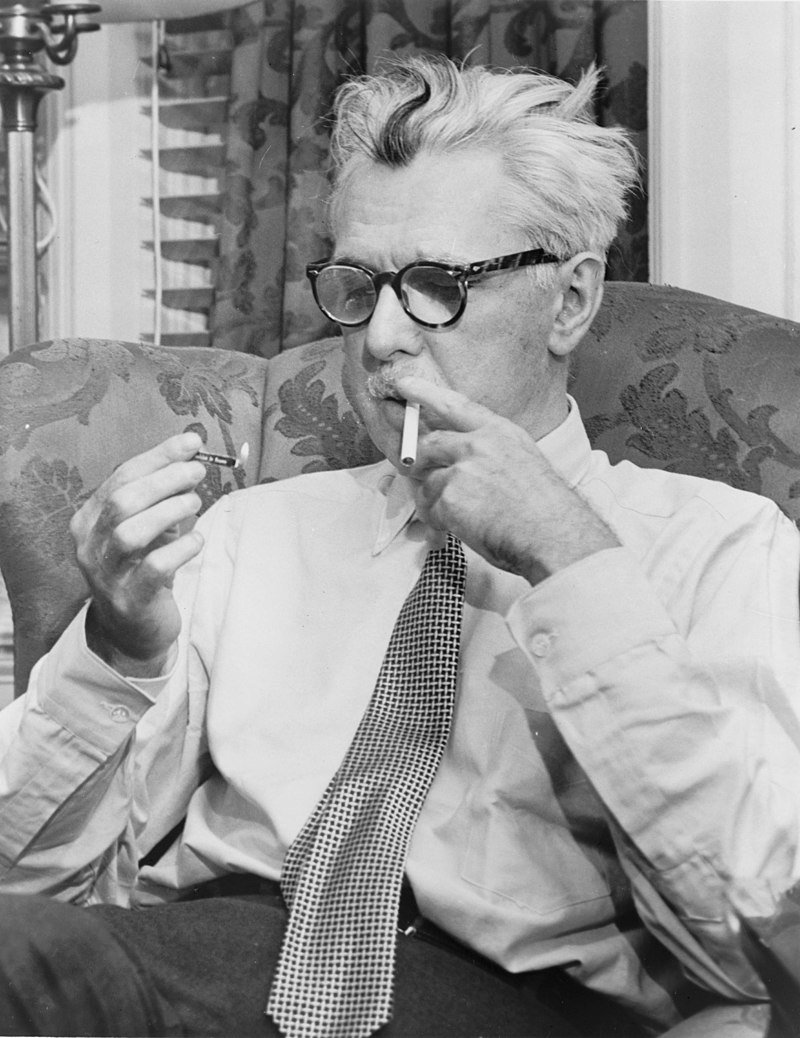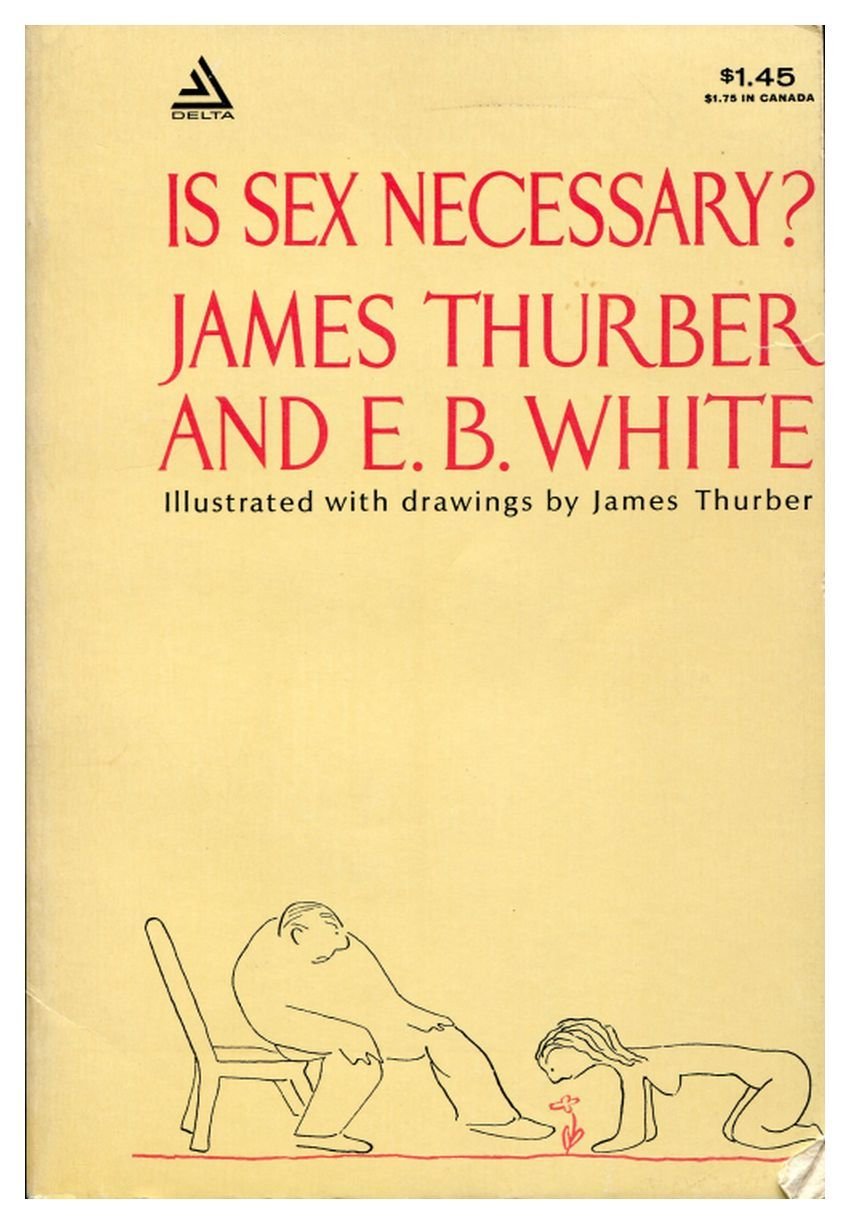IS SEX NECESSARY?
Throughout the Roaring Twenties, sex had never had it so good.
Drinking was outlawed so there was more drinking than ever. Sex was considered strictly for married couples, which made it more fun when it wasn’t. And the theories of Sigmund Freud had stifled the last blushes of Victorian prudery. Men and women now talked of libido, the Oedipal complex, the Pleasure Principle, Penis envy. . .
And then suddenly, it ended. Not the sex, but the fun. A week after the 1929 Stock Market crash, a little book came out in a small printing. Its title posed the question no one dared to ask during all that Freudian chatter. Is Sex Necessary?
Each chapter of the little book suggested volumes:
— The Nature of the American Male
— How to Tell Love from Passion
— What Should Children Tell Parents?
— Claustrophobia, or What Every Young Wife Should Know. . .
Thurber (on right) and White
Few had heard of the book’s authors, but it soon became a best-seller, launching the careers of James Thurber and E.B. White. Decades later, when Thurber was America’s most celebrated humorist and White had penned Stuart Little and Charlotte’s Web, White recalled:
“Thurber and I were neither more, nor less, interested in the subject of love and marriage than anybody else of our age in that era. I recall that we were both profoundly interested in earning a living, and I think we somehow managed, simultaneously, to arrive at the conclusion that. . . the heavy writers had got sex down and were breaking its arm. We were determined that sex should maintain its high spirits.”
Thurber and White met in 1927 in the offices of a fresh new magazine, The New Yorker. Both were introverts, deep in their own thoughts. Thurber’s marriage had devolved into “a relationship charming, fine, and hurting.” White, who claimed to have “too small a heart, too large a pen,” was in love with a New Yorker editor, a married mother of two. Sharing a small office, Thurber and White comiserated. Then, noting that they also shared a love of parody, they decided to spoof the Freudian advice manuals that were all the rage in the Jazz Age.
Because sex is still hotly discussed and, it seems, still necessary, Is Sex Necessary? remains in print. And though its martini-dry humor may not be for everyone, it is still funny. The footnotes alone are worth the cost. “See Titheridge’s poetry,” one notes, “but don’t read it.” Another adds, “This is the first mention in this article of Narcissism. Don’t worry, you’ll hear more.”
The spoof is also spiced with pseudo-sexual terms you won’t find on Wikipedia because Thurber and White made them up. Überträgung Period. Diversion Subterfuge. Osculatory Justification. Schmalhausen Trouble. Recessive Knee. Both Thurber and White, who wrote alternate chapters, cited faux experts. Dr. Karl Zaner. Dr. Walter Titheridge. And in one string, “Zaner, Blifil, Gorley, Peschkar, Rittenhouse, and Matthiessen.”
Then there are the drawings. Compulsively doodling, Thurber had sent several to New Yorker editor Harold Ross. All were rejected. Still he doodled on, filling the small office until as White said, “they were more a problem of disposal than anything else.”
But the book, which neither writer gave much chance of being published, needed illustrations. So White gathered Thurber’s latest and inked in a few. Reviewing the manuscript, an editor at Harper’s said, “These, I take it, are the rough sketches from which the drawings wil be produced?” To which White cheerily responded, “No, these are the drawings themselves.”
Mocking Freud’s subconscious, Thurber dashed off “Unconscious Drawings” of men dwarfed by women, swooning couples, curious dogs. There are drawings of “Sex Substitutes,” including bowling, baseball and “six-day bicycle racing.” And then there is my favorite:
AMERICAN MALE POSTURE: PLATE 1. -- American men, more than any others, permit the complexities of the psycho-physical world to get them down. Often, while down, they will pass each other going somewhere, and exchange a small greeting.
Is Sex Necessary? forced the New Yorker to take Thurber’s doodles, well. . . seriously. Seeing the book, Harold Ross asked Thurber, “Where the hell did you get the idea you could draw?” But Thurber’s cartoons became regular features in the magazine.
Sadly, despite all the advice in Is Sex Necessary?, neither White nor Thurber seems to have learned much from it. A week after the book was published, White married that once-married woman he’d fallen for. They were together for the rest of their lives. Some Freudian complex, eh? Thurber divorced, married again, but remained haunted by women and the necessary pastime.
In 1950, when asked to write an introduction to the book’s latest edition, Thurber contributed just a couple paragraphs, then wrote to White on the side. “If you know anything about sex, let me know.”













